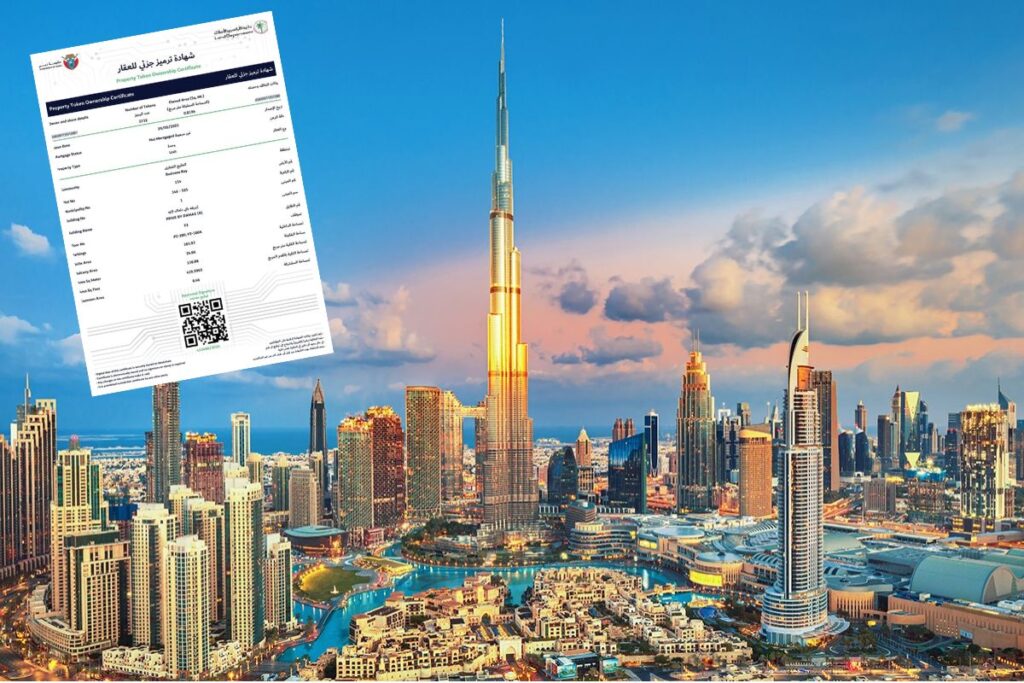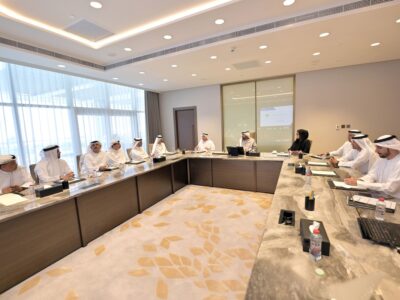Dubai is positioning itself at the forefront of a transformation that could reshape how people buy, own and trade property across the Middle East, experts told Arabian Business.
Real estate tokenization, which allows investors to purchase digital shares in physical properties, is gaining momentum in the emirate, with industry projections suggesting tokenized assets could reach a market value of AED60 billion ($16 billion) by 2033 across the region.
The technology enables fractional ownership of properties through blockchain-based tokens, breaking down traditional barriers that have kept luxury real estate investment beyond the reach of most people.
Instead of requiring millions in upfront capital, investors can now gain exposure to prime Dubai properties with commitments starting from as little as AED2,000 ($545).
“Dubai has always been a leader in innovation and digital transformation, and real estate tokenization is no exception,” Joseph Thomas, Co-Founder of Ellington Properties said.
“With clear regulatory frameworks, government-backed platforms, and growing participation from leading developers, the emirate is continuing to set benchmarks, and this time for how tokenized assets with a market value of AED60 billion ($16 billion) by 2033 in the Middle East region. Dubai is implementing it at scale in a transparent, secure, and efficient manner,” he added.
Dubai property tokenization attracts younger investors, say experts
The fractional ownership model is drawing particular interest from younger investors who were previously “priced out” from Dubai’s luxury property segment, according to Thomas.
The approach allows investors to diversify portfolios by spreading smaller investments across multiple properties, reducing risk exposure while sharing operational costs such as maintenance and service charges among co-owners.
“Fractional ownership democratises access to high-value real estate by significantly lowering the entry barrier,” Thomas explained.
“Instead of needing to invest millions upfront, individuals can now gain exposure to prime luxury properties in Dubai with capital commitments starting from as little as AED2,000, making property investment more attainable for the average person,” he added.
Echoing the sentiment, Bashir Kazour, Managing Director of Taurus, reinforced this accessibility argument.
“Dubai’s rising real estate prices have placed luxury properties out of reach for most residents. Tokenization solves this by enabling fractional ownership, allowing retail investors to gain exposure to appreciating property markets,” he explained, adding that near-instant settlement also reduces settlement risk and operational costs compared to traditional processes that can take weeks or months.
Dubai real estate tokenization brings liquidity, accessibility, lower costs

“It solves the liquidity problem by enabling peer-to-peer secondary market transfers and 24/7 subscription and redemption for open-ended real estate funds. The technology can also eliminate many intermediaries, reducing costs and complexity,” Kazour added.
In addition, professional property management services handle operational aspects including tenant acquisition, maintenance and regulatory compliance.
“A professional property manager oversees all operational aspects, including tenant acquisition, maintenance, and regulatory compliance, ensuring the asset remains profitable,” Thomas noted, adding that rental income is distributed proportionally to token holders based on their ownership stakes, with smart contracts automating the process to create passive income streams without direct ownership responsibilities.
Moreover, Dubai’s regulatory approach has become a cornerstone of the tokenization ecosystem’s development.
The Virtual Assets Regulatory Authority (VARA) and Dubai Land Department (DLD) have established legal frameworks governing tokenized assets, with VARA updating its Rulebook in May to formally regulate tokenized real-world assets under the new Asset-Referenced Virtual Assets classification.
“Dubai’s regulators have been exceptionally supportive of tokenized properties, with Dubai’s Virtual Assets Regulatory Authority (VARA) updating its Rulebook to formally regulate tokenized real-world assets (RWAs) under the new Asset-Referenced Virtual Assets (ARVA) classification,” Kazour explained.
The regulatory structure aligns with the Dubai Economic Agenda D33 and Real Estate Sector Strategy 2033, which aim to enhance sector attractiveness, efficiency and transparency through technological innovation.
“By providing legal clarity, launching pilot initiatives, and enforcing robust compliance standards, they are creating a trusted framework for digital property ownership,” Thomas added.
A critical milestone occurred in April when the DLD and VARA agreed to link Dubai’s real estate registry with property tokenization.
“From a legal aspect, a critical milestone back in April was to have the DLD and VARA agree to link the Dubai real-estate registry with the tokenization of property,” Kazour said, adding that from a token security point of view, it’s all about making sure the private keys are securely stored.
The technical infrastructure supporting tokenization relies on blockchain technology to record transactions on secure, decentralised ledgers, reducing fraud and misrepresentation risks, Ellington Properties’ Thomas said.
“Transactions are recorded on secure, decentralised ledgers, significantly reducing the risk of fraud or misrepresentation,” he explained.
Major deals boost confidence in Dubai’s tokenized property market
The market has already witnessed substantial transactions, demonstrating the technology’s commercial viability, Taurus’ Kazour said, citing the signing of a $3 billion agreement between Dubai’s MultiBank Group, real estate company MAG, and blockchain provider Mavryk.
“There was also the DLD (Dubai Land Department), the Central Bank of the UAE, and the Dubai Future Foundation, which launched the first licensed tokenized real-estate project,” he explained.
Today, property developers are integrating tokenization into sales strategies, recognising the potential to attract new investor segments and international buyers seeking portfolio diversification options.
“Developers are increasingly integrating tokenization into their sales strategies, recognising its potential to attract new investor segments,” Thomas observed, adding that the integration requires developers to build appropriate infrastructure, create user-friendly platforms and ensure regulatory compliance.
“We are still very early. Developers are building their digital asset expertise through workshops with leading technology providers like us, and can integrate tokenization platforms into their sales processes to offer fractional ownership options alongside traditional sales and leverage the technology to access global investor pools. They can also adapt their project structures to accommodate token-based ownership and automated compliance features,” Kazour echoed.
Despite progress, industry leaders acknowledge that tokenized real estate remains in early development stages. Market awareness and investor education represent primary challenges in driving broader adoption.
“The main challenge lies in tokenized real estate still being in the early stages of its product lifecycle,” Thomas said.
“As with any emerging innovation, building market awareness is crucial to drive investor confidence and participation. Educating stakeholders on the benefits and mechanics of tokenization, alongside ensuring platforms remain fully licensed, transparent, and compliant, will be key to establishing trust and achieving broader adoption.”
Other key hurdles, according to Kazour includes “security, regulatory compliance, and education.”
“Tokenization should simply be called digitisation and offers the same economic and social protection as we have in the traditional world,” he said.
“There is also the challenge to onboard and equip the full real estate value chain with the right technology to accept and recognise tokenized real estate as the perfect equivalent to traditional real estate,” Kazour added.
Tokenization transforms property ownership and investment in Dubai
Industry projections suggest continued growth across multiple property types, extending beyond luxury residential to include commercial properties, retail spaces and mixed-use developments.
“We anticipate a significant rise in tokenized offerings across various asset classes, including residential, commercial, and mixed-use developments,” Thomas predicted.
“We also expect greater institutional participation and the emergence of secondary markets for trading property tokens.”
“The future of real estate tokenization in Dubai looks exceptionally promising. We expect to see continued growth in transaction volumes, with more property types being tokenized beyond luxury residential to include commercial properties, retail spaces, and mixed-use developments,” Kazour added.
The technology’s integration with broader digital finance ecosystems, including lending and automated market making, could provide 24/7 liquidity through compliant decentralised finance platforms, he added.
Both industry leaders view tokenization as representing more than technological advancement, describing it as a fundamental shift in property ownership, access and trading mechanisms.
“Tokenization is more than a technological breakthrough, as it represents a fundamental shift in how real estate is owned, accessed, and traded,” Thomas concluded, adding that “for developers, investors, and regulators alike, it opens the door to a more inclusive, efficient, and transparent market.”
Kazour further emphasised on practical implications. “Properly implemented, tokenization makes buying private securities as easy as buying a book online. Dubai is showing that with the right infrastructure and regulatory framework, tokenization can transform real estate from an illiquid, high-barrier asset class into an accessible market with new opportunities.”





